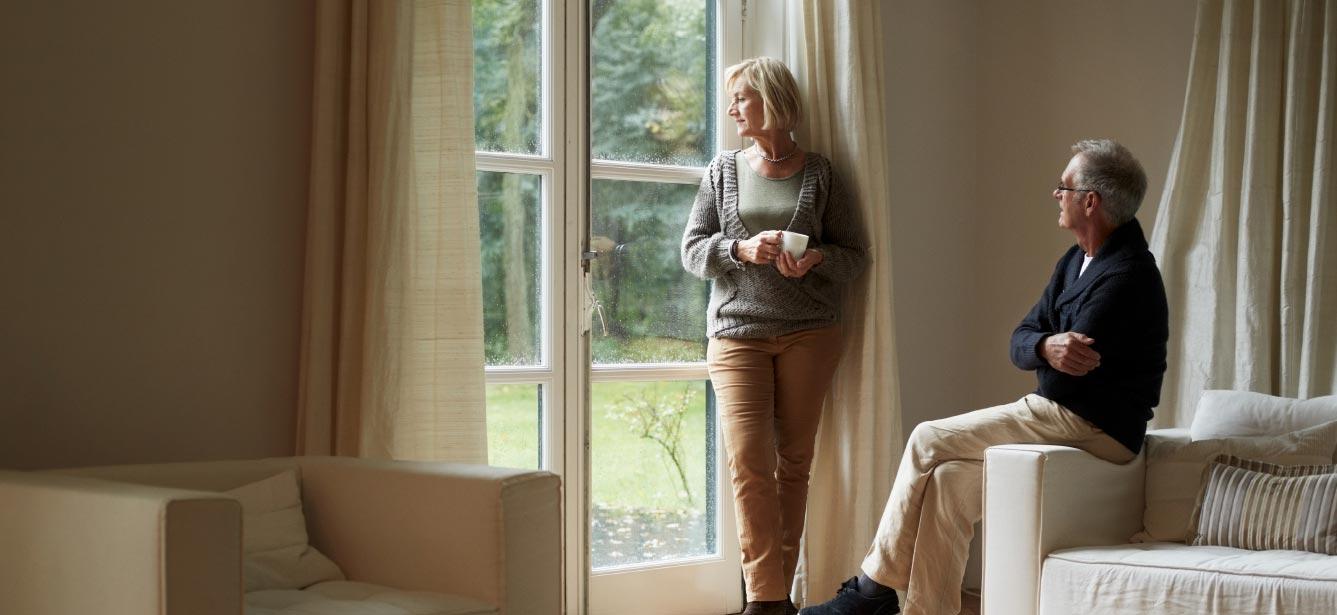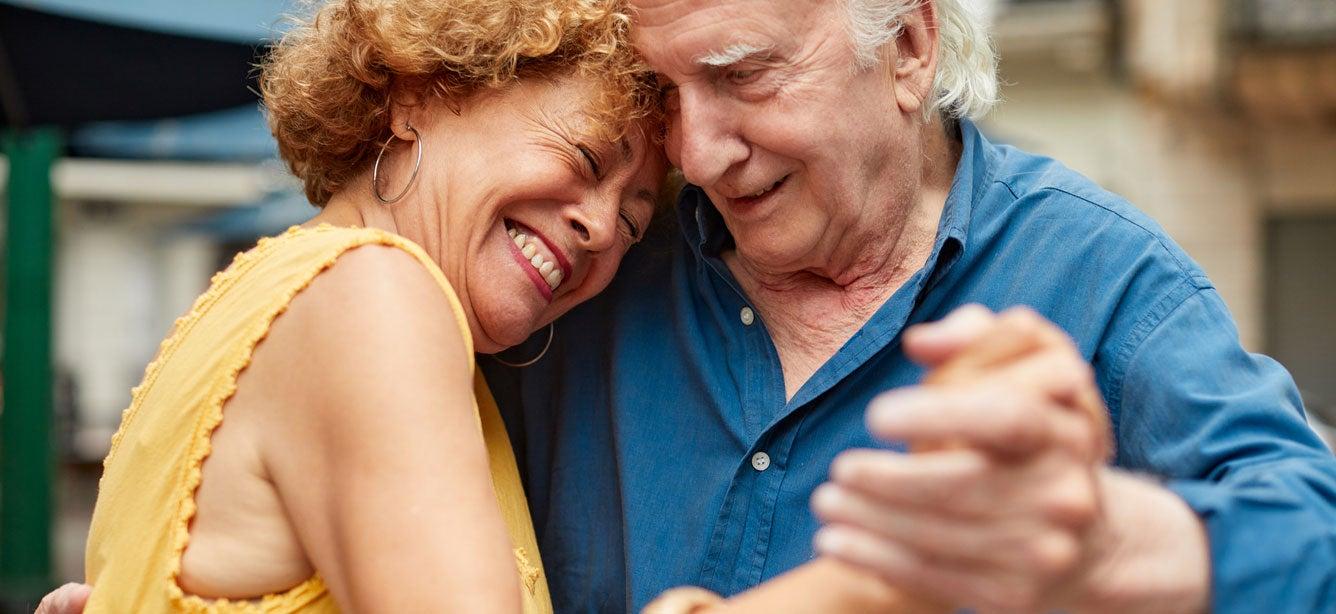
Related Topics
Why is my sex drive so low?
Many of us will grapple with this question the older we get … if we haven’t already. What once was a given—the vital sexual spark of our youth—may have become less predictable and intense. If your libido has left the building, you’re definitely not alone.
Yes, it’s common that our libido changes as we age—but it’s not inevitable, either. There are many effective ways to reignite that flame.
That matters. Good sexual health remains important throughout our lifespan. It allows us to create and maintain emotional intimacy with our partner. It helps us manage stress. And having an active sex life and a healthy libido can even reduce our risk factors for chronic disease.
What, exactly, is libido?
Libido refers to a person's overall sexual drive or desire for sexual activity. It’s influenced by a complex blend of internal and external factors, including biological, psychological, and social aspects.
Low libido, on the other hand, is when a person has a persistent or recurrent lack of interest in sexual activity or sexual intimacy.
Is it normal for libido to decrease with age?
Libido is a term that describes both our sexual drive in general, and our desire for sex specifically.
Libido varies from person to person and even day to day, and many different outside factors play into it: biology, psychology, and the society and culture we live in, too.
Low libido—which both males and females can experience—describes a persistent or recurrent lack of interest in sexual activity or sexual intimacy.
Is it normal for libido to decrease with age?
Yes. It's common for women to experience a drop in sexual desire and function beginning in their late 40s and early 50s.1 For older men, this shift may not happen until their 60s and 70s.2 Loss of libido is very individual. Some people may notice a dramatic change, while others notice no difference at all.
When sex drive is low or absent for six months or more—and it causes significant personal distress or relationship issues—it’s sometimes called Hypoactive Sexual Desire Disorder (HSDD), or Male Hypoactive Sexual Desire Disorder (MHSDD) in men. People with this condition lack sexual thoughts and fantasies and have little or no interest in sexual activity, either alone or with a partner. They are unresponsive to their partner's sexual signals and may even avoid sex entirely.
What causes a loss of libido in older men?
Very often, low testosterone is the culprit. During a process called andropause—a transition similar to menopause for women—testosterone levels start dropping naturally. While many men don’t notice any changes in their sexual desire, some may experience a lowered libido or problems achieving and maintaining an erection (erectile dysfunction). If you have this concern, ask your doctor whether a medication for ED could work for you.
There are other symptoms of low testosterone, too, including loss of body and facial hair, depression, decreased muscle tone, and fatigue. If your health care provider suspects you have low testosterone, a simple blood test can confirm it. And there are effective treatments for it. Ask about a testosterone patch, injection, gel, or subdermal pellet (inserted under the skin).
Finally, low testosterone can be a side effect of certain medical conditions (like obstructive sleep apnea) or their treatments (like chemotherapy for prostate cancer).
What causes a loss of libido in older women?
Menopause-related changes can cause a woman’s interest in sex to decline or disappear entirely. In fact, in her book Managing Your Menopause Naturally, author Maryon Stewart cites studies showing that up to 75% of women notice a decreased sex drive since menopause.
Libido loss can take an emotional toll on older women. It impacts not only their self-esteem but also their relationships. Research shows that the link between low libido among women and personal distress is highest during the midlife period.3
What else can affect women's sex drive after 40? Declining testosterone levels during this time might reduce sexual desire.4 And decreasing estrogen levels can cause vaginal dryness and discomfort. As Stewart explained, this can mean painful sex for many women who rather would avoid it and other unpleasant side effects—which include bleeding and urinary tract infections (UTIs).
Hot flashes that often accompany lower estrogen levels can interfere with sexual motivation as well. After all, said Stewart, “If you are also suffering from night sweats, it’s not surprising that you don’t feel very sexy.”
Some women also may feel less desirable due to age-related physical changes—such as weight gain, sagging skin, and thinning hair. This diminished self-image may make them feel more inhibited with their partner, too.
If your libido has plummeted and you think it’s related to menopause, talk to your health care provider. There are a variety of prescription and over-the-counter treatment options for menopause and its symptoms. Whether any of these options is right for you is highly individualized and personal—and some do carry health risks. Be sure to work closely with your doctor before and during any treatments you try.
What else causes a loss of libido in men and women?
Aside from specific factors related to sex hormones, there are some universal factors affecting sex drive, too.
Medication
Certain prescription drugs carry side effects that can dampen your desire. Some medications known to cause sexual difficulties include:
- Selective serotonin reuptake inhibitors (SSRIs): used to treat depression and other mental health conditions
- Blood pressure medications: used to control hypertension
- Antipsychotics: used to treat hallucinations, delusions, and disordered thinking as well as for some people who live with dementia
- Opioids: commonly prescribed for pain
- Statins: used to control high cholesterol
- Histamine-2 antagonists (H2 blockers): used for indigestion, acid reflux, and GERD
- Chemotherapy drugs
If you're taking one or more prescription drugs and have noticed a drop in your sexual interest, ask your doctor if medication may be to blame. You might be able to stop your medication, take a lower dose, or switch to another type.
Mental health issues
Mental health challenges that impact your happiness and well-being can leave you feeling disinterested in sexual activity. These include:
- Depression
- Anxiety
- Relationship issues
- Past traumatic experiences
- Grief
If psychological factors are causing your low libido, addressing them can help you get back on track. This might involve talking to a mental health professional, for example, or practicing yoga to combat your anxiety.
Maintaining a positive outlook can go a long way, too, Stewart said. “What matters most is how you feel about yourself. If you have lost your sparkle, it’s possible to reframe your attitudes and habits and get back to being your old self, or even better.”
Chronic disease
Chronic diseases such as obesity, arthritis, diabetes, and heart disease can have a major impact on sexual function. Partially, this is because of the physical symptoms connected to the conditions themselves—like pain or fatigue. But many of the medications used to treat them (see above) can also cause unwanted sexual side effects.
Lifestyle habits
Sexual arousal and performance depend on having good overall health. That’s why it’s important to limit or avoid lifestyle behaviors that can impair your body’s natural functions, such as smoking, alcohol overuse, or illicit drug use.
Leading a healthy lifestyle can help you feel better, boost your confidence, and give you more energy to enjoy sexual activity. This means exercising regularly, eating nutritious foods, managing your stress, and getting plenty of sleep.
What should I do if I’ve lost my libido, but my partner hasn't?
Since changes in your sex drive can strain your relationship with your partner, try to avoid sweeping the issue under the rug. Communication is key. Be honest with them about how you're feeling, and listen carefully to their needs, too.
"When your libido is low, expecting your partner to understand what is going on, without explaining, is an easy trap to fall into," Stewart said.
The most important thing is that you both continue to communicate physically and emotionally. Take some time to explain what you are going through and ask for support."
Keep in mind that being intimate doesn't necessarily mean intercourse. Other acts of intimacy—such as massage, foreplay, or even holding hands and cuddling with your partner—can spark passion and bring you closer together, too.
Take action and talk to your doctor
If you’re happy with your life and the way you feel, lack of libido isn't a problem. But if you want to stay sexually active and you’re concerned about your dwindling sex drive, it’s important to confront the issue head-on.
Should you notice a sudden or significant drop in your libido, arrange a visit with your primary care provider for a complete physical check-up. This will allow them to rule out any health or medication-related causes and explore other potential root causes for your fluctuating drive.
Embarrassed about talking to your doctor? Starting the sex conversation can feel awkward at first. But keep in mind sexual health is an essential part of your overall health, and it’s important to advocate for yourself. You can initiate a dialogue simply by asking questions. Remember you’re not alone; libido issues are extremely common among both men and women. Your provider likely sees patients every day who have symptoms just like yours.
An active sex life is possible at any age
Stewart wants all of us to know a dwindling sex drive is not an inevitable part of aging.
"There are no standards for a normal level of libido, and there is no such thing as a normal sex drive," she said. "What is normal for one couple may be abnormal for another. You can judge your libido only by your own standards. If you are concerned that your sexual desire has diminished, the good news is you can take action to restore it."
Includes excerpts from the book Manage Your Menopause Naturally. Copyright ©2020 by Maryon Stewart. Printed with permission from New World Library—www.newworldlibrary.com.
Sources
1. WebMD. How Sex Drive Changes Through the Years. July 28, 2023. Found on the internet at https://www.webmd.com/sex-relationships/ss/slideshow-sex-drive-changes-age
2. 1. Mayp Clinic. Sexual Health. Is loss of sex drive normal as men get older? Found on the internet at https://www.mayoclinic.org/healthy-lifestyle/sexual-health/expert-answers/loss-of-sex-drive/faq-20058237
3. 1. Jia Zheng, et al. Prevalence of Low Sexual Desire With Associated Distress Across the Adult Life Span: An Australian Cross-Sectional Study. The Journal of Sexual Medicine. October 2022. Found on the internet at https://pubmed.ncbi.nlm.nih.gov/32773344/
4. Alice Scott and Louise Newson. Should we be prescribing testosterone to perimenopausal and menopausal women? A guide to prescribing testosterone to women in primary care. British Journal of General Practice. April 2020. Found on the internet at https://www.ncbi.nlm.nih.gov/pmc/articles/PMC7098532


